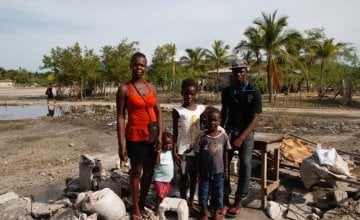
Read our 2024 annual report

Knowledge Hub
Concern use music to warn about the dangers of Ebola

Music is being used to educate people about important issues in the world’s poorest countries.
In some cases, lyrics carry critical messages that can be the difference between life and death.
In most of the countries in which Concern Worldwide works, literacy rates are extremely low.
This is true particularly among women and girls who tend to drop out of school at a far younger age than their male counterparts.
As a result, music has played a critical role in our work to promote awareness of important issues.
Ebola outbreak
In Sierra Leone and Liberia, the two countries worst affected by the west African ebola outbreak, Concern is helping to broadcast radio jingles to educate people about the risks of infection.
This is critical in Sierra Leone, where strict curfews, quarantines and lockdowns have effectively shut off entire communities - particularly those living in poverty - from the outside world.
Music and education
After the 2010 earthquake in Haiti, which destroyed buildings and displaced 3.5 million people, we used music as part of an educational programme designed to ease the trauma experienced by children.
In addition, radio jingles and other broadcasts were used to target the population with information about such services as water and food distributions, the location of blood banks and other emergency information.

In Bangladesh, Concern has used music and drama to educate people about the difficulties of living with the stigma of debilitative diseases such as polio.
Other programmes use songs in schools to help children understand messages about sanitation and hygiene.
By teaching lyrics that rhyme and are easy to remember, simple messages about hand washing, for example, can be easily conveyed.
Social aspects of music
Community meetings are used widely in our programmes to change perceptions about such issues as HIV and AIDS.
Community conversations have proven key to changing views about female genital mutilation, keeping girls out of school and the issue of young brides.
In many meetings, music and dance are used to provide an important unifying and social aspect.
Get involved
If you'd like to support our work in the world's poorest countries, please click the button below.





